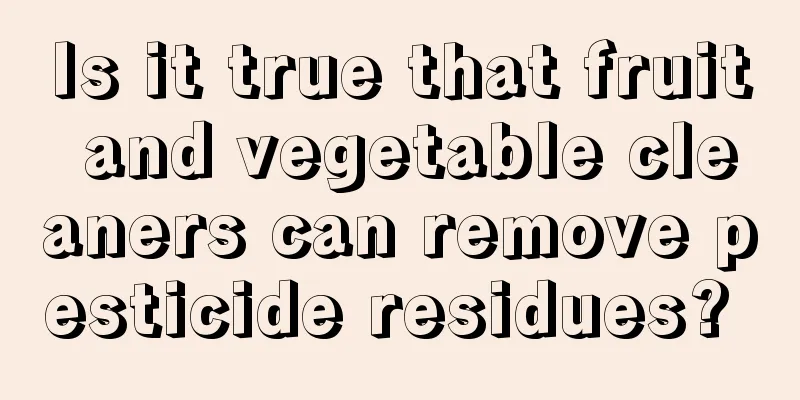Is it true that fruit and vegetable cleaners can remove pesticide residues?

|
Now people's lives are getting better and better, so people often pay more attention to their health. In the past, we washed fruits and vegetables with tap water, detergent, or fine salt. Nowadays, people prefer to use fruit and vegetable cleaners, which are usually claimed to be able to effectively remove pesticide residues after use. So, is this fruit and vegetable cleaning agent trustworthy? Is its effect really that magical? Detergents have no magical effect in removing pesticide residues Detergents are mainly composed of ingredients such as surfactants, emulsifiers, flavors and pigments. When using detergent to wash fruits and vegetables, the emulsifier ingredients it contains can decompose oil stains, making substances that are difficult to dissolve in water soluble, turning them into water-soluble emulsions, and then separating the dirt from the objects to be cleaned through surfactants, and then removing them through scrubbing and running water. Some types of detergents also contain ingredients that inhibit pathogenic microorganisms, which can effectively prevent bacterial proliferation and the spread of disease. However, detergents may not necessarily remove pesticide residues. Scientists have conducted many studies on this. There are also many fruit and vegetable cleaning agents in the United States, and many of them claim that using their own detergents to absorb water can better remove pesticide residues. Some claim that it is 98% better than clean water, and some even claim that it is 3, 4, 5, or even 10 times better than clean water. The University of California conducted a study that analyzed five commonly used fruit and vegetable detergents on the market and used these five fruit and vegetable detergents to wash fruits and vegetables. The results showed that washing fruits and vegetables with fruit and vegetable detergents can indeed remove some pesticide residues, but it cannot remove 100%. Compared with rinsing with clean water, washing fruits and vegetables with fruit and vegetable detergents did not achieve the high efficiency claimed by the manufacturers. On the contrary, there is no obvious difference in the removal of pesticide residues between fruit and vegetable detergents and rinsing fruits and vegetables with clean water. A department of the Connecticut state government in the United States also conducted a large-scale study on cleaning and removing pesticide residues. They selected 28 batches of lettuce, strawberries and other fruits and vegetables, and tested the changes in the content of several common pesticides before and after washing. They used tap water, detergent and four special "fruit and vegetable cleaners". The results showed that each method could significantly reduce pesticide residues, but the effectiveness of these specialized fruit and vegetable cleaners was not much different from that of plain water. They also found that whether these pesticides are easily washed off has little to do with their solubility, and are mainly removed by the mechanical movement during washing. Therefore, washing fruits with fruit and vegetable detergent is not better than washing with water. When washing fruits and vegetables, rinse them under tap water for more than 30 seconds and scrub them. |
<<: What are the benefits of hand care?
>>: Glue cleaner is not a panacea, this is how glue should be removed!
Recommend
How many years can you live after breast cancer surgery
How many years can you live after breast cancer s...
What are the dangers of café au lait spots
When it comes to café au lait spots, many people ...
Is cervical lesion cervical cancer? What is the difference between cervical lesion and cervical cancer?
Cervical lesions are not cervical cancer, but may...
Can lithospermum officinale oil be used to treat eczema
Autumn is here. Although autumn is a very cool se...
Symptoms of detoxification after taking a medicinal bath
With the improvement of living standards, people ...
What are the hazards of hair treatment ointment
Hair can keep our scalp warm and protect it, but ...
Can liver cancer recur after radiotherapy in the late stage?
Can liver cancer recur after radiotherapy in the ...
What are the symptoms of prostate cancer
As we all know, the reason why men develop prosta...
What preparations are needed before laparoscopic gastric cancer resection? Learn about preoperative preparations
Before laparoscopic gastric cancer resection, ade...
Can hamartoma be completely cured?
Hamartoma is a malignant tumor with a unique path...
Can eating skewers in the summer cause liver cancer? These symptoms are very likely to be liver cancer
Liver cancer is the third most common malignant t...
The order of using sunscreen and isolation cream
Some girls use isolation cream instead of sunscre...
Bigeminy of premature heart beats
The fast-paced life shows that young people are u...
What are the early symptoms of cervical cancer
The early symptoms of cervical cancer include abn...
What are the bisphosphonates?
When women reach around 50 years old, as the estr...









